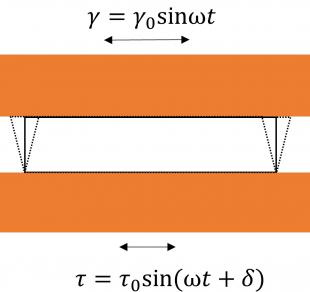Food texture is related to the way our senses perceive and feel the rheological and mechanical properties of edible substances. For example a potato chip is crispy; an apple is crunchy; butter is soft; bread is firm; candy is hard; yogurt is smooth; cream is thick; cake is moist, and honey is sticky. Food texture is critical for the consumer and impacts on a product’s market share. It is affected by the composition, manufacturing process, storage conditions and aging. It impacts the final quality and nutrition value of the food product. Food industry strives to improve texture while enhancing the product’s nutritional value and health benefits. For example, healthy oleogels can be used in substitution of harmful trans/saturated fats while retaining the sense of a “mouthful” product.
Texture is complex to quantify, as it is the result of interplay of the food mechanical and rheological properties as physically sensed in the mouth. It is the result of the complex movement of chewing involving our jaws, teeth, and tongue, and the combined comminution (particle size distribution change) and gradual dissolution of substances in saliva.
This project aims to develop and combine mechanical and rheological testing methodologies that will characterize texture rapidly and reliably, in real time, during the manufacturing and storage period. The experimental program will be complemented by state-of-the-art artificial intelligence (AI) and machine learning (ML) methodologies in order to correlate improved texture with optimized manufacturing and storage processes.
The ideal candidate will combine strong experimental and computational skills, an interest in food science and engineering, mechanics, rheology and numerical methods/software (e.g., MATLAB, Python).
Further Information:
https://vasileioskoutsos.wixsite.com/softmaterials
www.eng.ed.ac.uk/about/people/dr-dimitrios-i-gerogiorgis
The University of Edinburgh is committed to equality of opportunity for all its staff and students, and promotes a culture of inclusivity. Please see details here: https://www.ed.ac.uk/equality-diversity
Closing Date:
Principal Supervisor:
Assistant Supervisor:
Eligibility:
An undergraduate degree in Chemical/Mechanical Engineering, or a closely related area (Physics, Chemistry), with a strong background in computational modelling.
Minimum entry qualification - an Honours degree at 2:1 or above (or International equivalent) in a relevant science or engineering discipline, possibly supported by an MSc Degree. Further information on English language requirements for EU/Overseas applicants.
Funding:
Applications are welcomed from self-funded students, or students who are applying for scholarships from the University of Edinburgh or elsewhere



